- Home
- Neal Stephenson
The Rise and Fall of D.O.D.O.: A Novel Page 32
The Rise and Fall of D.O.D.O.: A Novel Read online
Page 32
There was a long moment as she stood in the doorway, troubled. Then whatever was going on inside her resolved itself, and she nodded once, decisively. “All right,” she said. “I am not happy to be doing this, but I will help you complete the mission with the psalm book. But let us do it now, and be done with it already.”
I have already described the events of my DEDE enough times—for indeed, I had lived through them enough times!—that I need not recount them now in detail. I now knew what to expect so well, knew the nuances of all these people who thought that they were meeting me for the first time (although as usual Stephen Day, the printer, commented that there was something very familiar about me).
Having been clothed by Mary Fitch, hauled by Goodman Griggs, ferried by the handsome brothers, having conned Hezekiah Usher and Stephen Day, having avoided the lechery of the cooper . . . having done all of these things as efficiently as possible, I headed out on the Watertown Road in the soggy August air, sealed bucket under my arm, using the shovel as a walking stick . . . praying that this time, I would not see that fucking boiler-foundation.
I did not. The erasure of Sir Edward Greylock from Elizabethan London had likewise erased all his possible investments, including this one.
Heartened by this, I measured out the length of my arm away from the boulder, and dug the length of my arm in depth. The clam and oyster shells seemed like old friends as I unearthed them. I settled the bucket in the hole, shoveled all the soil back in, stamped it down with unwonted exuberance, and headed back, a final time, toward Cambridge.
And then as ever, returning through the town, across on the ferry, back along the oxcart path, to the home of Goody Fitch. A final conversation with her and her young daughter Elizabeth about working with us. And then home.
Journal Entry of
Rebecca East-Oda
AUGUST 22
Temperature 89F. Dusty, dry. Barometer steady. Lettuce bolted. Kale ready to harvest but will be too bitter. Perennial herbs in fine form. Asters magnificent.
It finally happened today. In the former vegetable garden, which had been dug up so often earlier in the summer but lately lay unmolested while Tristan went to the London DTAP. We gathered around it. Mel dug a hole. Tristan has one arm in a homemade sling he had fashioned from two T-shirts tied together, and could not dig; Erszebet was in stockings and heels; Mel insisted Frank and I are age-exempted. So she dug it all herself. No doubt it gave her satisfaction, for all the times she had to bury it before.
And there it was. The barrel. Quite small, and very old, and soft around the edges where damp had found its way into the wood. But not rotted away. That cooper knew his business.
I have not been to a DTAP. I was not in residence during Erszebet’s first few weeks exploring her powers in the ODEC. Other than seeing her transform herself, this was my first concrete experience of magic. I have seen that plot dug up a dozen times, and it has never contained a small well-sealed barrel containing an unspeakably valuable seventeenth-century hymnal.
Until today.
Diachronicle
DAYS 391–436 (SEPTEMBER–OCTOBER, YEAR 1)
In which we sell a book
THE CATASTROPHIC DEDE FROM WHICH Les never returned, and the recovery of the Bay Psalm Book from Frank and Rebecca’s backyard, occurred at the beginning of the final week of August. Not until early October did we actually bank the money. In the meantime, General Frink continued to sign our paychecks, for our recovery of the book had saved our bacon politically. As with General Schneider, Les Holgate’s death was deeply and sincerely regretted, but apparently considered to be just one of those things that happened when patriots went into harm’s way for the defense of their homeland.
So, September was a month of unruffling all the legal feathers, getting the i’s dotted and the t’s crossed. Frink’s brain trust concocted a story to explain Les Holgate’s disappearance. It wasn’t a very convincing story, but it didn’t need to be; friends and family of people who worked in clandestine service knew that mysterious, unexplained death was something that happened.
There was a no-casket memorial service for him. This was attended by his family—including his uncle, Roger Blevins, who, like Tristan and myself, flew down from Boston. There was (obviously) no interment, but at the solemn reception afterward, in a bland conference room with recessed fluorescent lights, we were fortified with bad institutional coffee and Royal Dansk butter cookies. Tristan and I were there to represent the Cambridge office; the others had sent cards and flowers. I had hoped to avoid Blevins. Our turbulent past included two incidents of sexual harassment that would have sufficed to get any other man fired. Somehow, however, he cornered me at the hazelnut-flavored-cream dispenser, all smiles and smarm.
“I’m sorry for your loss,” I said, refraining from direct eye contact.
“It’s terrible,” he said, slightly hurried, as if to get the formalities out of the way. “But I must say, Mel, it’s good to see you’ve landed on your feet. I don’t need to tell you how concerned I was when you left the department so suddenly. I was afraid your head was turned by, let’s say, non-professional considerations.” He gestured vaguely toward Tristan. Tristan pivoted and took a stride in our direction. I hadn’t told him about the harassment, but he knew how to read me, and he seemed to have an overdeveloped damsel-in-distress radar.
“I have no regrets,” I said, deciding to skip the creamer.
“Oh, neither do I,” Blevins said. “It’s a far better fit for you.” The insult didn’t need to be spelled out: You were going nowhere in academia.
“It’s an excellent fit,” I heard Tristan say from over my right shoulder. Blevins’s eyes rose to see him. Tristan rested his hand on my upper arm and squeezed gently. “This woman is the most talented linguist, translator, scholar, and researcher I’ve ever encountered. And a brilliant team player. Worth her weight in plutonium. Thank God we ended up with her.” Reader, I do believe I blushed the slightest bit with pleasure.
Blevins gave us both a forced smile, as if somebody were tightening his belt without his consent. “I’ve been a mere advisor until now, as you know, and my involvement is to be ramped up, or so I’m told,” he said, with a glance across the room at General Frink, who was offering his condolences to Les Holgate’s mother. It was a classic Blevins move—making it seem as though he was being drawn unwilling into the project, affecting a sort of patrician befuddlement.
Tristan’s hand almost imperceptibly tightened around my arm. “So I’m informed,” he said.
“I’ve been working with General Frink and Dr. Rudge for years on the precursors to DODO, always on the assumption it would peter out. Never saw myself as the cofounder of a new department. But life takes us to surprising places!”
Tristan’s grip now tightened considerably. Shut up, Stokes! “When I approached you, sir, you refused involvement in DODO,” he said.
“Not exactly, Colonel Lyons,” said Blevins, always happy to seem wiser than anyone else. “I was just making it clear that I wasn’t right for that particular role. Which”—and here he had the audacity to reach out and pat my left arm—“clearly was the right move, as it left a space open for our Mel here to fill. I knew my skills would be better applied elsewhere, as is proving to be correct.” He smiled. “I look forward to working with you. Just like old times, Mel.”
WE HAD MADE no preparations whatsoever for actually selling the book. We’d hardly even thought about it. Once it was in our hands we realized that this was going to be complicated. The mere existence of DODO was a highly classified secret, so we couldn’t very well sell it openly. To make a long and tediously legal story short, we ended up establishing a private trust to act as a front operation for DODO. It was called the East House Trust, and the story was that it was the legal owner and custodian of Rebecca and Frank’s house, with the two of them being its trustees. As such, the trust now became the legal owner of the book, which had, after all, been discovered on the property. Rebecca and Frank
named Tristan and me officers of the trust, with authority to conduct certain business operations, and on that authority we opened an account at a bank in Harvard Square and rented a large safe deposit box where we placed the book for safekeeping while we entered into negotiations with various auction houses. Expert advice was that we would get the highest price in New York or London, and that we should wait for a few weeks so that the auction house could advertise the book and spread the word to collectors around the world.
So it was that in the first week of October, Tristan and I flew down to New York, he carrying the book in a locked metal briefcase. Sitting in the window seat, I gazed out at the fall colors sweeping down across the countryside from the north. The forests of Connecticut were nearing their peak in a glorious carpet of fiery red. I couldn’t help thinking of Goody Fitch, who had been dead for over three hundred years, but who to me was every bit as alive as Rebecca and Erszebet and the others. After all, with the assistance of Erszebet and the ODEC, I could go and visit her anytime I wished, and so, to me, she really was alive. How would she and the others in the colonial Boston DTAP look upon the changing of the leaves? Probably as a warning of bitter cold and hard times to come.
The auction house was on Fifth Avenue, across from Central Park, and not too far from the Met. The neighborhood was, of course, where the richest people lived, and had been living for a long time, and so as we walked into the establishment and conducted our business with the proprietors, I had the comforting sense that we had come to the right place.
Our copy of the Bay Psalm Book was the fourteenth and last item on a list of high-priced antiquities that were auctioned off over the course of a couple of hours. I’d grown up in a family that respected books and old things, but I’d never experienced anything remotely like this auction. Sitting there in my new skirt suit from Lord & Taylor and my mom’s best strand of pearls, watching the rich people and their representatives bid millions of dollars on various ancient artifacts, was a view into another world as strange to me as anything we could have visited through the ODEC.
The Bay Psalm Book had clearly attracted the attention of several well-heeled, highly motivated collectors, and so the bidding was intense. In moments it had blown through our expected price of five million dollars and shot upwards from there. Not until we got above ten million did bidders begin dropping out. It came down to a bidding duel between a collector from Los Angeles, who’d been sitting in the front row the whole time, and a man who had walked into the auction house and taken a seat at the back only moments before the bidding had started. In the end, the latter won, calmly nodding to the auctioneer whenever the man from LA raised his bid. The entire process had lasted less than a minute. The book sold for fourteen million dollars.
I assumed that payment, and the physical handover of the book, would be taken care of later, with the buyer and the auctioneer involving lawyers and bankers and so on. But after the auction finished and the room cleared out, the man who had bought the Bay Psalm Book walked up the aisle, pocketing a phone on which he had just finished making a call. He was dressed in an impeccable dove-grey suit, with a vest under the jacket that gave it a distinctive look—either retro or fashion-forward, I had no idea. He was in his fifties, well built, trim. He was groomed meticulously but a bit oddly, with sideburns that were longer than the norm. He wore rimless eyeglasses with tinted lenses. This detail had been noticeable when he had first walked in from the street. I’d guessed at the time that the lenses were those photochromic things that darken automatically in sunlight, and that they would lighten over the course of a few minutes indoors. But they had not changed; his eyes were still just barely visible behind a grey screen of tinted glass.
Tristan and I were standing in the aisle as this man walked by us. “If you would just give me a minute,” he said, on his way by. We were too surprised to answer, so he looked back over his shoulder with a slightly bemused expression. “I won’t be long.”
“Of course,” Tristan said, just to be polite. But I sensed he was a little uneasy. We were here under cover, pretending that DODO didn’t exist, that we were just representatives of the East House Trust. Our job was to hand the book to the auctioneer, watch what happened, and get out. Not to socialize. We had a flight back to Boston in a couple of hours, and a dinner date with our colleagues. But it would be bad manners to bolt out of the place, ignoring a man who had just handed over fourteen million dollars, and so Tristan and I drifted to the back of the room while the buyer conducted a discussion with the auction house staff. We looked out the windows at Central Park, which was glorious, approaching peak color. Strollers and bicyclists were out enjoying the crisp autumn day, and park employees were out in force, raking up leaves and fallen branches.
“Beautiful day, isn’t it?” said the buyer, as if reading my thoughts.
Tristan and I turned away from the window to see him approaching us. He was holding the Bay Psalm Book on which he had just spent fourteen million dollars. “My name is Frederick,” he announced. Then he casually tucked the book under his left arm, as if it were a paperback he’d just bought in an airport bookstore, and extended his right hand to shake.
“Mel,” I said, since it seemed we were operating on a first-name basis.
“Tristan,” said my companion. We shook hands with Frederick. Still keeping the book tucked under his arm, he pulled a nice pair of gloves out of the pockets of his overcoat and pulled them on while moving toward the exit. Tristan held the door open for him, and for me. A fortuitous gap in traffic enabled us to cross Fifth Avenue, and a few minutes later we were strolling in the park together.
“Where on earth did the East House Trust find this remarkable specimen?” Frederick asked. He moved briskly. Tristan kept up with ease; I had to step lively in my borrowed heels.
“Respecting the confidentiality of the trustees, I’ll treat that as a rhetorical question, Frederick,” Tristan answered.
Frederick slowed to a stop and turned toward us. “It’s new,” he remarked.
Both of us must have looked goggle-eyed. This amused him. “The trust, I mean. Only established a few weeks ago. Oh no, I wasn’t referring to the book. The book is obviously quite old!” He pulled it out from his armpit and opened it up, flipping curiously through a few pages.
“You are correct on both counts, Frederick,” I said. I found it strange to be looking at those pages, darkened and mottled with the passage of hundreds of years, which I had seen fresh from the printing press only a few weeks earlier. To be quite honest, it gave me a feeling of satisfaction that bordered on smugness. DODO had come together, as I’ve explained, in a crazily haphazard and chaotic fashion, with many twists and turns, and a few tragedies, that we’d never foreseen. But it had come together. I had traveled back in time, on many occasions. I had achieved my mission. Proof of that was right in front of me, in Frederick’s gloved hands, and in the enormously swollen bank account of the East House Trust.
Frederick turned his back on us, a bit rudely, and resumed walking. He forked off the main path onto a smaller trail that rambled off through a wooded section of the park. We followed him, kicking through fallen leaves. He said, “I suppose you’re going to tell me that this was discovered squirreled away in the attic or something, and once the East-Odas understood its value, they decided to form the trust in order to manage the financial ramifications. I suppose that story hangs together reasonably well.”
Lagging half a pace behind him, Tristan and I exchanged a glance. It was a bit difficult to hear him, because we were approaching an area where some groundskeepers were cleaning up fallen branches and leaves, tossing the debris into a gasoline-powered chipper that reduced everything to confetti and hurled it into the back of a truck. It was noisy. Frederick drew to a halt not far away from this machine and turned to face us again.
I understood. Or I thought I did. He wanted to speak to us privately, without fear of surveillance microphones picking up his words, and so he had moved to a noisy environment
.
“Do you know anything about markets?” Frederick asked. “Given your professional backgrounds, Dr. Melisande Stokes and Lieutenant Colonel Tristan Lyons, I’m guessing not really. Oh, you’ve read the odd article in the business section of the New York Times, and, as educated persons, you have some general background on which to draw. I like to think I’m a bit more up to speed on such things, as being related to my profession.”
“What profession is that, Frederick?” Tristan asked.
Frederick had tucked the book under his arm again—a habit I found quite annoying given the rarity and fragility of that artifact. No book collector would have treated it so cavalierly. This had freed his hands. Turning slightly away, he reached up and removed his shaded eyeglasses, folded them up, and slid them carefully into the breast pocket of his overcoat. For a moment he squinted against the bright golden sunlight of the New York autumn, showing creases around his eyes. He blinked a couple of times and then turned to face us. “The sort of profession,” he answered, “that places me in a position to spend fourteen million dollars on a book.”
“Touché,” Tristan said. Then his face went slack with amazement. He was staring at Frederick. I turned to look in the same direction, but didn’t see anything to explain Tristan’s reaction. There was something odd about Frederick’s eyes, which took me a moment to process. They were asymmetrical. His left pupil was dilated to the point where the blue iris could scarcely be seen, but the right pupil was constricted, as you’d expect when outdoors in broad daylight.
“It’s simple,” Frederick said, “but it’s not. Supply, demand, individual transactions, such as the one we have engaged in today—child’s play, on the level of a sidewalk lemonade stand. But when billions of them are integrated over centuries—not so simple at all. The resulting flows of information, encoded as fluctuations in prices, shifts in markets, are far beyond the ability of any one human mind to comprehend. Which is why such things are best left in the hands of professionals with the requisite training and, if I may say so, lineage. Good day.”

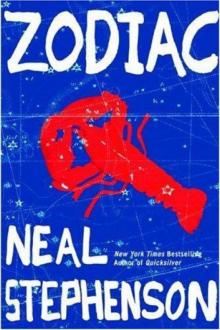 Zodiac: The Eco-Thriller
Zodiac: The Eco-Thriller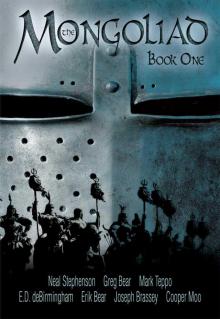 The Mongoliad: Book One
The Mongoliad: Book One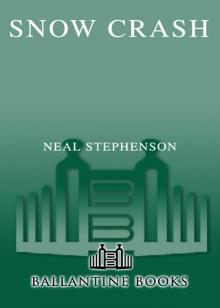 Snow Crash
Snow Crash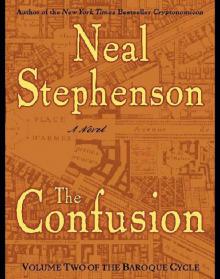 The Confusion: Volume Two of the Baroque Cycle
The Confusion: Volume Two of the Baroque Cycle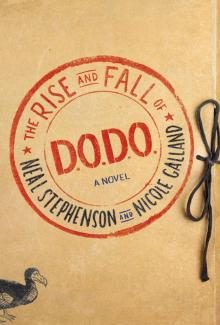 The Rise and Fall of D.O.D.O.
The Rise and Fall of D.O.D.O.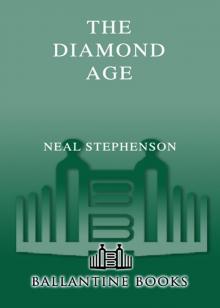 The Diamond Age: Or, a Young Lady's Illustrated Primer
The Diamond Age: Or, a Young Lady's Illustrated Primer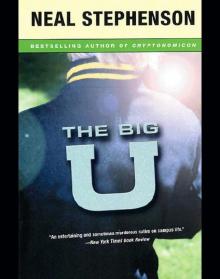 The Big U
The Big U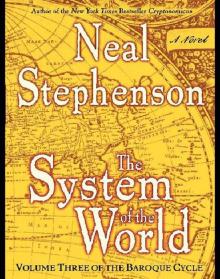 The System of the World: Volume Three of the Baroque Cycle
The System of the World: Volume Three of the Baroque Cycle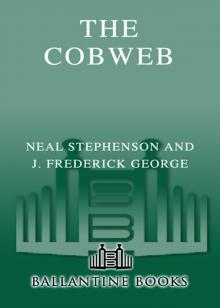 The Cobweb
The Cobweb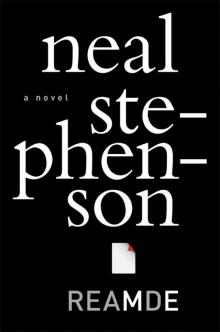 Reamde
Reamde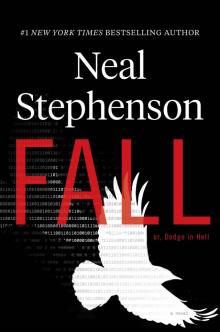 Fall; or, Dodge in Hell
Fall; or, Dodge in Hell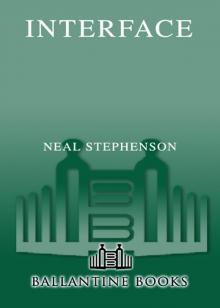 Interface
Interface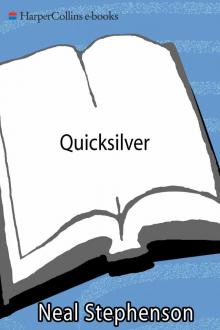 Quicksilver
Quicksilver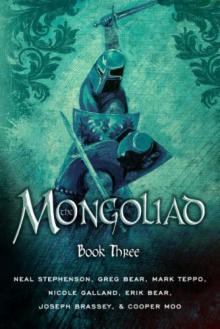 The Mongoliad: Book Three
The Mongoliad: Book Three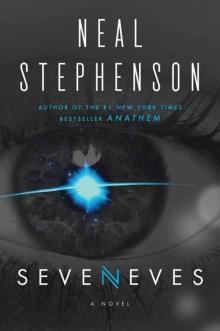 Seveneves
Seveneves Atmosphæra Incognita
Atmosphæra Incognita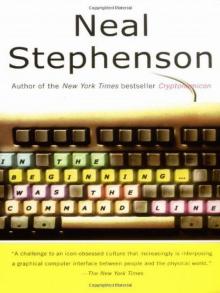 In the Beginning...Was the Command Line
In the Beginning...Was the Command Line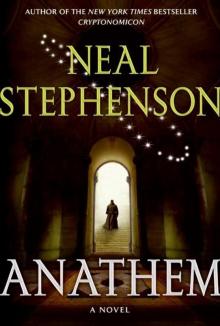 Anathem
Anathem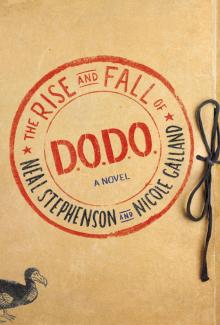 The Rise and Fall of D.O.D.O.: A Novel
The Rise and Fall of D.O.D.O.: A Novel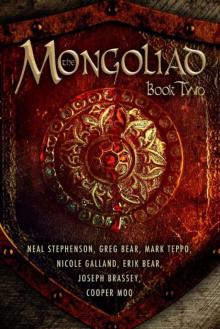 The Mongoliad: Book Two
The Mongoliad: Book Two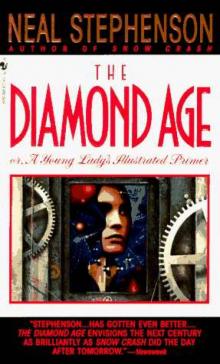 Diamond Age or a Young Lady's Illustrated Primer
Diamond Age or a Young Lady's Illustrated Primer THE System OF THE WORLD
THE System OF THE WORLD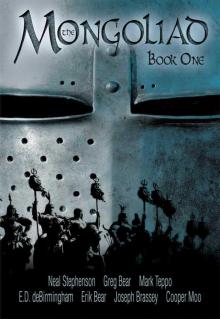 The Mongoliad: Book One tfs-1
The Mongoliad: Book One tfs-1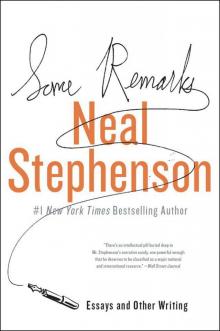 Some Remarks: Essays and Other Writing
Some Remarks: Essays and Other Writing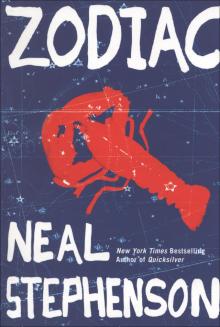 Zodiac
Zodiac Spew
Spew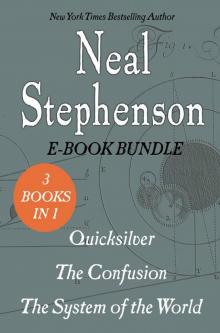 The Baroque Cycle: Quicksilver, the Confusion, and the System of the World
The Baroque Cycle: Quicksilver, the Confusion, and the System of the World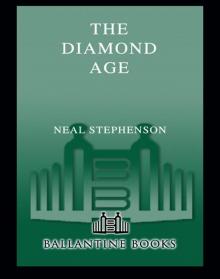 The Diamond Age
The Diamond Age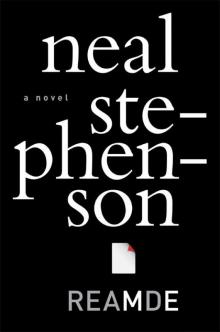 Reamde: A Novel
Reamde: A Novel In the Kingdom of Mao Bell
In the Kingdom of Mao Bell Mother Earth Mother Board
Mother Earth Mother Board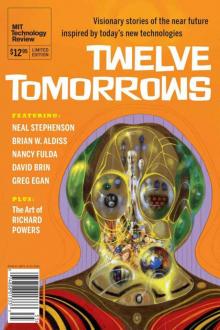 Twelve Tomorrows - Visionary stories of the near future inspired by today's technologies
Twelve Tomorrows - Visionary stories of the near future inspired by today's technologies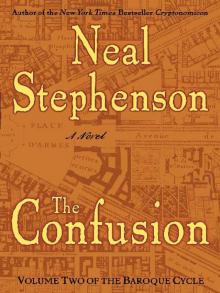 The Confusion
The Confusion The Great Simoleon Caper
The Great Simoleon Caper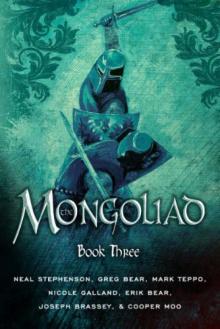 The Mongoliad: Book Three tfs-3
The Mongoliad: Book Three tfs-3